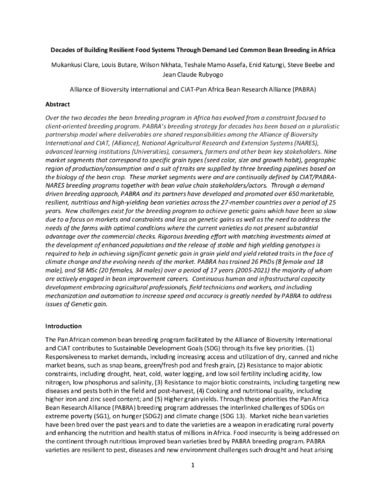Decades of building resilient food systems through demand led common bean breeding in Africa
Over the two decades the bean breeding program in Africa has evolved from a constraint focused to client-oriented breeding program. PABRA’s breeding strategy for decades has been based on a pluralistic partnership model where deliverables are shared responsibilities among the Alliance of Bioversity International and CIAT, (Alliance), National Agricultural Research and Extension Systems (NARES), advanced learning institutions (Universities), consumers, farmers and other bean key stakeholders. Nine market segments that correspond to specific grain types (seed color, size and growth habit), geographic region of production/consumption and a suit of traits are supplied by three breeding pipelines based on the biology of the bean crop. These market segments were and are continually defined by CIAT/PABRA-NARES breeding programs together with bean value chain stakeholders/actors. Through a demand driven breeding approach, PABRA and its partners have developed and promoted over 650 marketable, resilient, nutritious and high-yielding bean varieties across the 27-member countries over a period of 25 years. New challenges exist for the breeding program to achieve genetic gains which have been so slow due to a focus on markets and constraints and less on genetic gains as well as the need to address the needs of the farms with optimal conditions where the current varieties do not present substantial advantage over the commercial checks. Rigorous breeding effort with matching investments aimed at the development of enhanced populations and the release of stable and high yielding genotypes is required to help in achieving significant genetic gain in grain yield and yield related traits in the face of climate change and the evolving needs of the market. PABRA has trained 26 PhDs (8 female and 18 male), and 58 MSc (20 females, 34 males) over a period of 17 years (2005-2021) the majority of whom are actively engaged in bean improvement careers. Continuous human and infrastructural capacity development embracing agricultural professionals, field technicians and workers, and including mechanization and automation to increase speed and accuracy is greatly needed by PABRA to address issues of Genetic gain.

